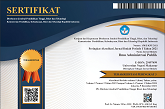The Effect of Service Quality on Customer Satisfaction at PT. PLN (Persero) in Makassar City
(1) Institut Teknologi dan Bisnis Nobel Indonesia
(*) Corresponding Author
DOI: https://doi.org/10.26858/jiap.v12i2.37192
Abstract
This study aims to determine the service quality of PT. PLN (Persero) in Makassar City. This type of research is quantitative. Data collection techniques were carried out through library research and field research in the form of observations, questionnaires, agency data and documentation. The total population of the study was 24,332 with a sample of 100 people selected at random. The analytical method used is the Simple Linear Regression method. The results showed that the indicators of Service Quality at PT. PLN (Persero) in Makassar City is good because the percentage of Service Quality has high values or a high percentage, especially on the Empathy indicator. Customer Satisfaction in Makassar City is very good because Customer Satisfaction is higher than Service Quality, which means that customers in Makassar City are very satisfied with the service or performance of service providers. Service Quality has an effect on Customer Satisfaction, from the regression model obtained significant results and the percentage value is 66 percent.
Keywords
Full Text:
PDFReferences
Absori, M. H., & Ramdani, D. (2020). Prepaid Electricity Marketing Communication Strategy at PT. PLN (Persero) Temanggung Customer Service Unit. AFEBI Management and Business Review, 5(1), 47–53.
Ali, A., Rahut, D. B., Mottaleb, K. A., & Aryal, J. P. (2019). Alternate energy sources for lighting among rural households in the Himalayan region of Pakistan: Access and impact. Energy & Environment, 30(7), 1291–1312.
Batchimeg, B. (2017). Financial performance determinants of organizations: The case of Mongolian companies. Journal of Competitiveness, 9(3), 22–33.
Damarta, R., Hidayat, A., & Abdullah, A. S. (2021). The application of k-nearest neighbors classifier for sentiment analysis of PT PLN (Persero) twitter account service quality. Journal of Physics: Conference Series, 1722(1), 12002.
Jessop, B. (2017). The Future of the State in an Era of Globalization. Challenges of Globalization, 13–26.
Johnston, A., & Huggins, R. (2018). Regional growth dynamics in the service sector: The determinants of employment change in UK regions, 1971–2005. Growth and Change, 49(1), 71–96.
Katz, D. M. (2012). Quantitative legal prediction-or-how i learned to stop worrying and start preparing for the data-driven future of the legal services industry. Emory LJ, 62, 909.
Khartabiel, M. I., & Saydam, S. (2014). Banks employees satisfaction as a lead to customers satisfaction. International Journal of Business and Social Science, 5(9).
Kramsch, C. (2014). Teaching foreign languages in an era of globalization: Introduction. The Modern Language Journal, 98(1), 296–311.
Kymlicka, W. (2010). Citizenship in an Era of Globalization. The Cosmopolitanism Reader, 435–443.
Maassen, M. A. (2018). Sustainable Business Models: An Imperative in the Strategic Management of Companies and Organizations. Management Dynamics in the Knowledge Economy, 6(2), 323–335.
Montoya, F. G., Peña-García, A., Juaidi, A., & Manzano-Agugliaro, F. (2017). Indoor lighting techniques: An overview of evolution and new trends for energy saving. Energy and Buildings, 140, 50–60.
Mulder, P., De Groot, H. L. F., & Pfeiffer, B. (2014). Dynamics and determinants of energy intensity in the service sector: A cross-country analysis, 1980–2005. Ecological Economics, 100, 1–15.
Nabunome, A., & Prihatminingtyas, B. (2016). Public Service Quality. Journal of Economics and Sustainable Development, 7, 22.
Novianti, K. R. (2019). Achieving competitive advantage through knowledge management practices: Knowledge-based view (KBV) strategy on Indonesia electricity sector. APMBA (Asia Pacific Management and Business Application), 7(3), 163–176.
Owolabi, S. A., Obiakor, R. T., & Okwu, A. T. (2011). Investigating liquidity profitabulity relationship in business organizations: a studi of selected quoted companies in Nigeria. British Journal of Economics, Finance and Management Sciences, 1, 2.
Quick, J., & Hall, S. (2015). Part three: The quantitative approach. Journal of Perioperative Practice, 25(10), 192–196.
Ramanathan, U., Subramanian, N., & Parrott, G. (2017). Role of social media in retail network operations and marketing to enhance customer satisfaction. International Journal of Operations & Production Management.
Samani, S. A., & Samani, S. A. (2012). The impact of indoor lighting on students’ learning performance in learning environments: A knowledge internalization perspective. International Journal of Business and Social Science, 3(24).
Shamsudin, A. S. Bin, Kassim, A. W. B. M., Hassan, M. G., & Johari, N. A. (2010). Preliminary insights on the effect of Islamic work ethic on relationship marketing and customer satisfaction. The Journal of Human Resource and Adult Learning, 6(1), 106.
Spivak, G. C. (2013). An aesthetic education in the era of globalization. Harvard University Press.
Sulaiman, O. K., Waridha, A., Hendrawan, D., Ekalestari, S., Suhendi, A., Wulan, S., Pratiwy, D., Sahri, Z., Hariani, S., & Siregar, A. (2019). Implementation of String Matching Algorithm in Customer Data PT. PLN (Persero) Krueng Geukueh District. Journal of Physics: Conference Series, 1363(1), 12082.
Susilawati, E. (2016). Public services satisfaction based on sentiment analysis: Case study: Electrical services in Indonesia. 2016 International Conference on Information Technology Systems and Innovation (ICITSI), 1–6.
Susilo, R. A. (2014). IT value analysis by resource-based view theory: The case study of PT. PLN (Persero) Indonesia. 2014 International Conference on Information Technology Systems and Innovation (ICITSI), 213–218.
Article Metrics
Abstract view : 325 times | PDF view : 68 timesRefbacks
- There are currently no refbacks.
Copyright (c) 2022 Tunggul Prasodjo

This work is licensed under a Creative Commons Attribution 4.0 International License.
Diterbitkan oleh:
Program Studi Ilmu Administrasi Publik
Program Pascasarjana Universitas Negeri Makassar
JIAP Index By:

This work is licensed under a Creative Commons Attribution 4.0 International License.









